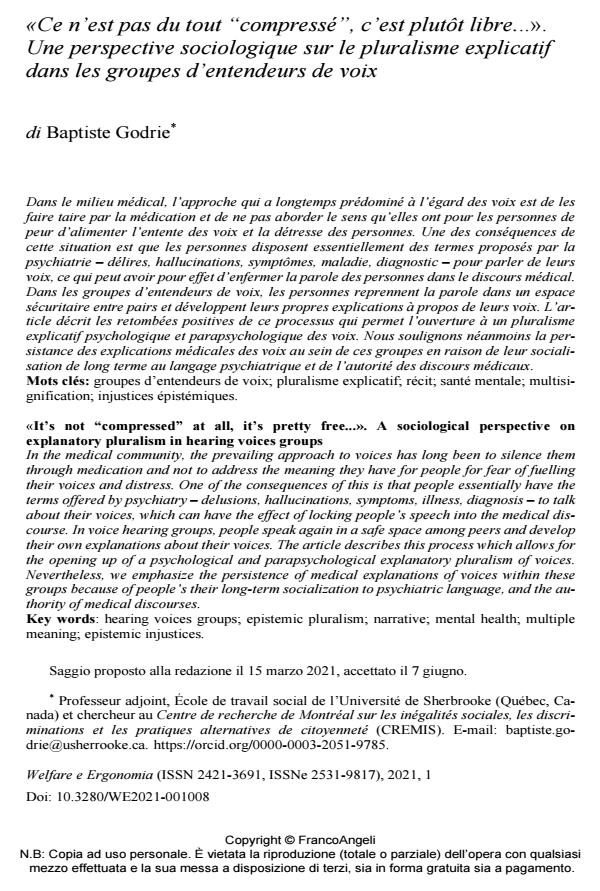«It’s not "compressed" at all, it’s pretty free...». A sociological perspective on explanatory pluralism in hearing voices groups In the medical community, the prevailing approach
Journal title WELFARE E ERGONOMIA
Author/s Baptiste Godrie
Publishing Year 2021 Issue 2021/1
Language Italian Pages 12 P. 78-88 File size 310 KB
DOI 10.3280/WE2021-001008
DOI is like a bar code for intellectual property: to have more infomation
click here
Below, you can see the article first page
If you want to buy this article in PDF format, you can do it, following the instructions to buy download credits

FrancoAngeli is member of Publishers International Linking Association, Inc (PILA), a not-for-profit association which run the CrossRef service enabling links to and from online scholarly content.
In the medical community, the prevailing approach to voices has long been to silence them through medication and not to address the meaning they have for people for fear of fuelling their voices and distress. One of the consequences of this is that people essentially have the terms offered by psychiatry - delusions, hallucinations, symptoms, illness, diagnosis - to talk about their voices, which can have the effect of locking people’s speech into the medical dis-course. In voice hearing groups, people speak again in a safe space among peers and devel-op their own explanations about their voices. The article describes this process which allows for the opening up of a psychological and parapsychological explanatory pluralism of voices. Nevertheless, we emphasize the persistence of medical explanations of voices within these groups because of people’s their long-term socialization to psychiatric language, and the au-thority of medical discourses.
Keywords: hearing voices groups; epistemic pluralism; narrative; mental health; multiple meaning; epistemic injustices
- Beavan V. (2012). Myriad voices, myriad meanings. Review of the research into the subjective experience of hearing voices. In: Geekie J, Randal P., Lampshire D. and Read J., eds. Experiencing Psychosis. Personnal and Professional Perspective. London: Routledge, pp. 146-154.
- Blackman L. (2014). Embodiement and Voice Hearing. INTERdisciplina, 2(3): 295-313.
- Corin E. (2002). Se rétablir après une crise psychotique: ouvrir une voie? Retrouver sa voix? Santé mentale au Québec, 27(1): 65-82.
- Crichton P., Carel H. and Kidd I.J. (2017). Epistemic injustice in psychiatry. BJPsych Bulletin, 41: 65‑70.
- Grard J. (2016). A bon entendeur, de la schizophrénie à l'entente de voix, catégories émergentes en pratique dans le champ des alternatives à la psychiatrie. In: Cano N., Henry J-M., Lagier F. et coll., Eds., Classifications et catégories en psychiatrie: enjeux éthiques. Bordeaux: LEH éditions, pp. 79-86.
- Jacob K. (2012). Patient experience and psychiatric discourse. The Psychiatrist, 36 (11): 414-417.
- James A. (2001). Raising our voices: An account of the Hearing Voices Movement. Gloucester: Handsell.
- Kirmayer L.J. and Gold I. (2011). Re-Socializing Psychiatry. In: Choudhury S. and Slaby J., Eds., Critical neuroscience. West Sussex, UK: Wiley-Blackwell, pp. 305-330.
- Longden E. (2017). Listening to the Voices People Hear: Auditory Hallucinations Beyond a Diagnostic Framework. Journal of Humanistic Psychology, 57(6): 573-601. DOI: 10.1177/0022167817696838
- Longden E., Madill A. and Waterman M.G. (2012). Dissociation, Trauma, and the Role of Lived Experience: Toward a New Conceptualization of Voice Hearing. Psychological Bulletin, 138 (1): 28-76.
- Molinié M. (2018). Le mouvement sur l’entente des voix. Topique, 144(3): 109-123.
- Read J., Haslam N. and Magliano L. (2013). Prejudice, Stigma and “Schizophrenia”. The role of bio-genetic ideology. In: Read J. and Dillon J., Eds. Models of Madness: Psychological, Social, and Biological Approaches to Psychosis, London: Routledge, pp. 157-177.
- Romme M. and Escher S. (2000). Making sense of voices. London: Mind Publication.
- Schrader S.R. (2013). Illuminating the heterogeneity of voices in a multiple perspectives research paradigm. Psychosis: Psychological, Social and Integrative Approaches, 5(3): 216-225. DOI: 10.1080/17522439.2013.845593
- Styron T., Utter L. and Davidson L. (2017). The hearing voices network: initial lessons and future directions for mental health professionals and Systems of Care. Psychiatric Quarterly, 88: 769-785. DOI: 10.1007/s11126-017-9491-1
Baptiste Godrie, «Ce n’est pas du tout "compressé", c’est plutôt libre...». Une perspective sociologique sur le pluralisme explicatif dans les groupes d’entendeurs de voix in "WELFARE E ERGONOMIA" 1/2021, pp 78-88, DOI: 10.3280/WE2021-001008